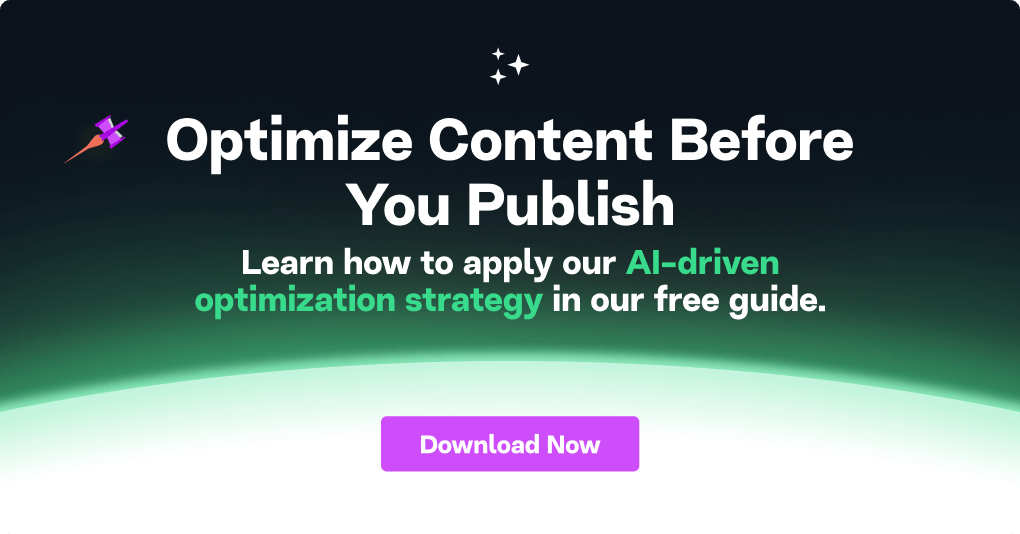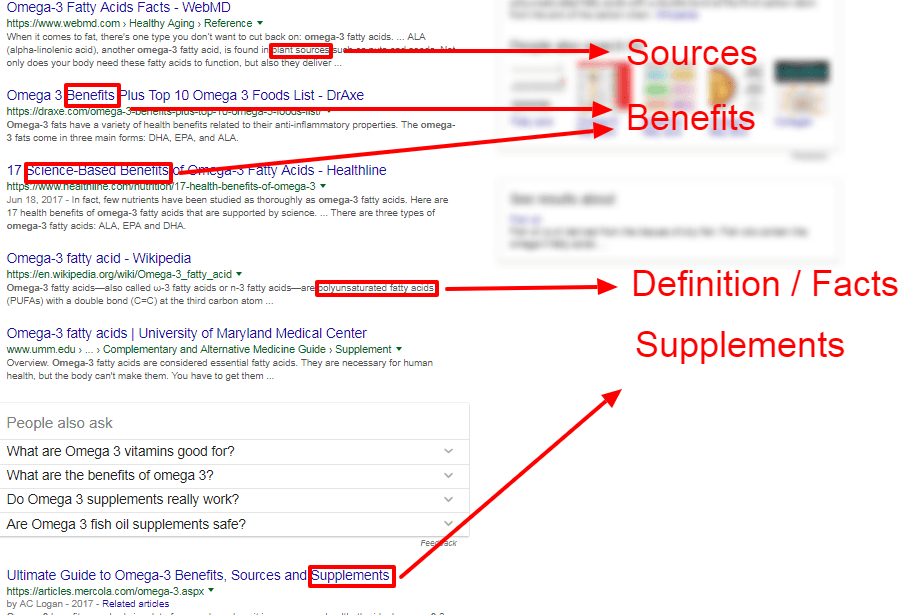Content Optimization vs SEO: What’s the Difference?
Is the keyword dead? No. But the game continues changing, as it has every year since first writing this post in 2017. While the keyword is still relevant, SEO has become more complex as Google gets smarter. With its enhanced ability to understand both user queries and content on page, we’re in a whole new world.
Gone are the days of pure keyword-optimization.
In essence, today you need to focus on covering a topic rather than zoning in on a specific keyword. Think “content strategy” rather than “keyword density”. Think content optimization.
But what is content optimization, exactly?
Topic Modeling: A Framework for Content
Keyword optimization is a framework for search engine optimization. Similarly, you could say that topic modeling (how words and phrases are interrelated) is a framework for content optimization. With the rise of semantic search, you need to focus on specific topics and cover them in depth. Content optimization focuses on providing the best answers to any given query with elaborate content. That includes which subtopics you need to cover to build authority in that niche.

With content optimization, you still start with a target keyword. But you need to cover the entire topic encompassing that keyword very well. In short, you need to show you’re an expert.
How to Create Authoritative Content
To create authoritative content, you can use tools like MarketMuse. But if you want to go at it on your own, here’s what you should consider.
- First, determine the goals of your content and decide what seed keyword your page will focus on. From a strategic perspective, start with your most important pages.
- Second, do your research. Identify who your target audience is and what it actually wants.
Here it’s a good idea is to group keywords that have a similar intent into one cluster. For example, let’s say you’re creating a page about omega 3. What are people searching for omega 3 looking for?
Look at the top 10 search results in the SERP for that term, and see what topics they cover. TF-IDF analysis can give you a better grasp of keywords, but it’s an ineffective content optimization tool.
Years ago, its popularity stemmed from the availability of free tools using this method. Fast forward to today and you can get the much more sophisticated topic modeling that drives MarketMuse for free.
If we analyze the page one results of “omega 3” — a generic query — this is what pops up:

We see a few common denominators right off the bat. Such as sources of omega 3, benefits, scientific information, and supplement information. You want to look at what those keywords signify and how they help cover the topic in a comprehensive way.
For example:

Once you have identified the searcher’s intent, create content around that, and build topic clusters with related content. Start with creating one pillar article that covers this topic broadly.
Next, link out to specific articles that cover the topic more in depth. Make sure to use anchor text that incorporates a relevant keyword.
- It’s important that you cover every relevant angle. For this case, examples might be:
- Definition of omega 3
- Sources of omega 3
- Benefits of omega 3
- Best omega 3 supplements
- Omega 3 reviews
- Links to pages where you can buy omega 3 supplements
- Links to pages where you can buy other supplements
- Links to pages with healthy eating and lifestyle
Keep in mind, this is only scratching the surface of optimized content. There are more things you should do , including improving UX/UI, A/B-testing, video and image optimization, but that goes beyond the scope of this article.
To find the proper keywords that fill the gaps in your content, you might be wondering…
Do Traditional SEO Tools Still Cut It?
Yes and no.
Current SEO tools are still very useful for optimization. But they’re often not end-to-end solutions. Content optimization software, in turn, provides a complete solution from conception to analyzing results.
An SEO tool like Moz or SEMRush offers powerful keyword research capabilities, but they don’t tackle the “topic” as much as they tackle the keyword. That is, they lack the semantic analysis to finds the gaps you need to fill to truly master a topic.
If you’re looking to create SEO content, you instead need to look at more holistic solutions. There are various options out there – aside from MarketMuse – that help optimizing content. But many solutions focus on enterprise-level companies and don’t meet the need of more mid-sized businesses.
We have briefly covered these before , and while there are a lot of great tools, few are truly complete, start-to-finish solutions.
Is the Keyword Obsolete?
No. The keyword is still very much relevant, but SEO has become more complex. Increasingly, you need to take the user’s full potential intent into consideration. RankBrain has helped ensure that comprehensive content that covers a topic extremely well ranks better than a disjointed page that is super optimized for a certain keyword.
The Takeaway
Think bigger. Content optimization may not always help search engine ranking as directly as link building will. But it helps search engines understand your intent and it helps you create better content. The latter in itself is key, irrespective of SEO, to build domain authority in any niche. It should also help boost your rankings along with traditional factors.
Understanding the intent behind a query and building great content around that is the best way to ensure your content stands the test of time.
Download the full guide here.
What you should do now
When you’re ready… here are 3 ways we can help you publish better content, faster:
- Book time with MarketMuse Schedule a live demo with one of our strategists to see how MarketMuse can help your team reach their content goals.
- If you’d like to learn how to create better content faster, visit our blog. It’s full of resources to help scale content.
- If you know another marketer who’d enjoy reading this page, share it with them via email, LinkedIn, Twitter, or Facebook.
Erik Van Buskirk oversaw nine of the largest SEO and content marketing data studies of 2016 and 2017. His company, ClickStream, did the research for client Neil Patel (NeilPatel.com). His main focus for the studies were keywords, semantic SEO, and how links effect search engine ranking. He was also Project Director for the “1 Million Google Search Results” rank study for Brian Dean of Backlinko, the number one up-voted piece of Q1 2016 on inbound.org and GrowthHackers.com.
